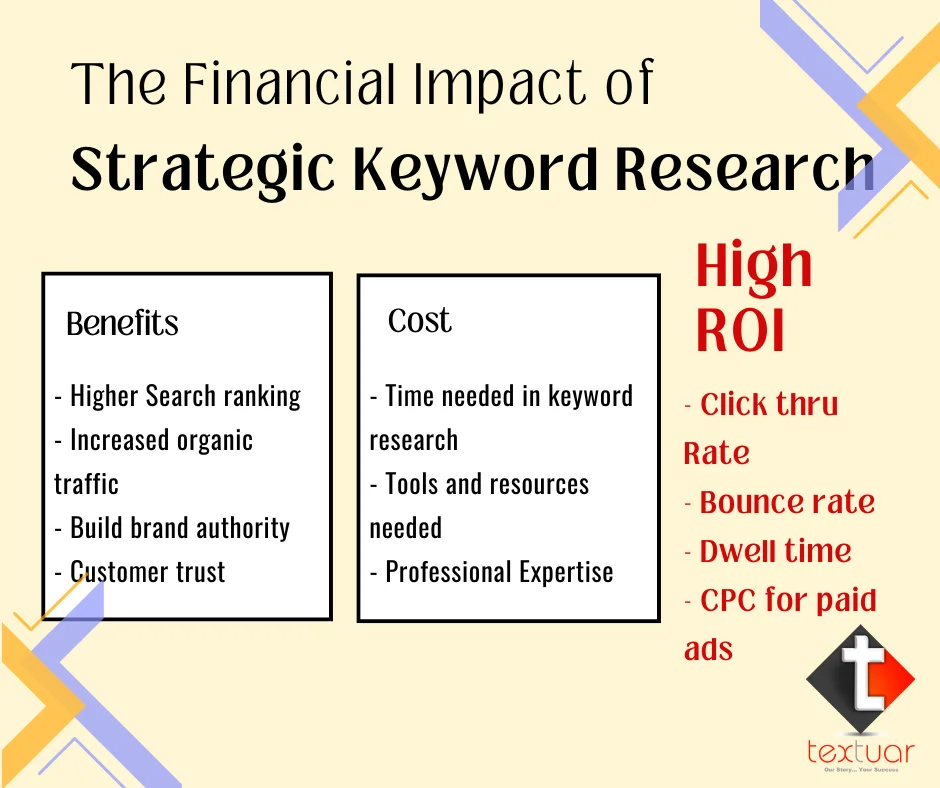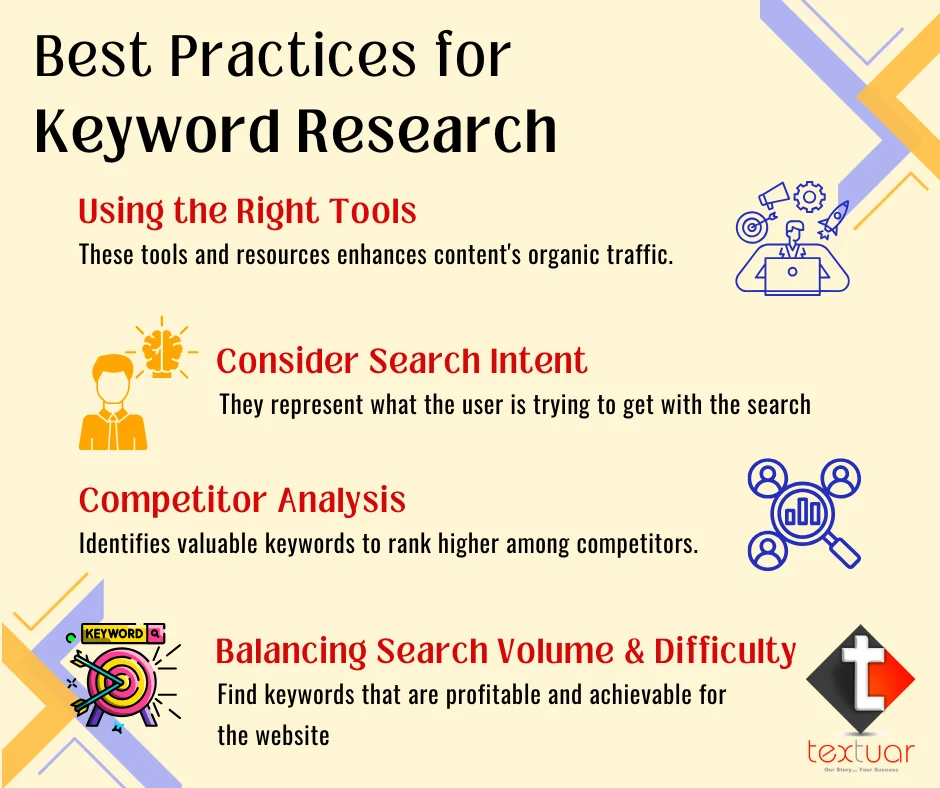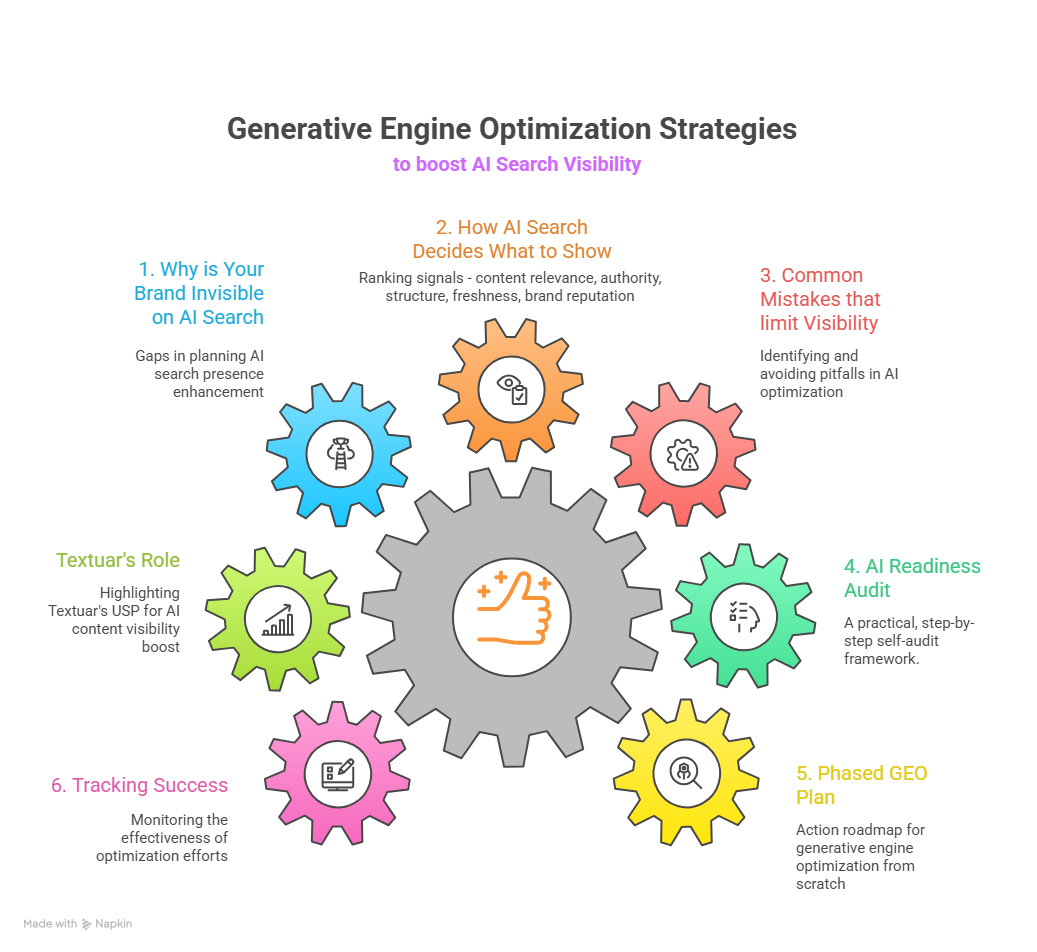In the modern day, content marketing has become an excellent option for businesses to reach potential customers. Investing in the content strategy helps to reach the maximum success rate within a short time. Keyword research in content creation is a cornerstone of a successful digital marketing strategy.
Businesses looking to thrive in the ever-evolving landscape of digital marketing need to stay ahead of the curve. Based on a recent report from 2016-2021, B2B businesses that utilize content marketing campaigns found that the average ROI increased from 317% to 1389%. Normally, the algorithms and user preferences change frequently.
It is important to harness the power of keyword research. The comprehensive guide explores the concept of how Strategic Keyword Research makes a difference in the quality of content and ROI.
Overview of Connection between Keywords and Content Success
Keyword research is essential for digital marketing. Keyword research is about understanding your audience, predicting their needs, as well as crafting content. It is important to create the best content strategy along with a combination of keywords.
To attain successful content marketing for launching a new product or service, it is essential to use appropriate Keywords to build traffic to your website. Engaging the keywords and content strategy lets you reap the maximum benefits within a short time. Combining keywords allows you to have some early success and gain long-term efficiency.
Why Do Many Businesses Struggle With Content ROI?
Content used in business marketing needs to focus on various attributes, including sales. Many businesses struggle with content ROI due to the lack of quality content in the product pages, customer service instructions and sales promotions. Content marketing needs to feed directly to the bottom line. “Return” in ROI can be denoted as the sales revenue. Without a strategic marketing approach to creating and distributing value, it will be difficult to reach maximum ROI.
Understanding Quality Content
Quality content is a strategic marketing approach that denotes creating valuable, relevant, and consistent content based on the niche. These would attract and retain the content for audiences. These would extensively drive profitable customer action within a short time. Creating high-quality content helps businesses or individuals who are looking to engage an audience. These ultimately build the brand image even across the competitive digital landscape. High-quality content has relevance, value, and user intent attracts audience engagement and is the backbone of a successful marketing strategy. These are quite helpful for establishing strong connections with potential customers.
How Does Quality Differ From Mere Keyword Stuffing?
Keyword stuffing is an unethical SEO approach in which the web pages are loaded with an irrelevant or excessive number of keywords. Keyword stuffing can manipulate search engines to gain high rankings. Keyword stuffing employs tactics like putting large sets of repeated keywords across the paragraphs, Meta Tags, and body of content. Sometimes, readers find it difficult to read the content, and it can compromise the integrity of the content. Some of the reasons contribute about keyword stuffing is detrimental to your website’s performance are
- Quality deterioration
- Hurts credibility
- Penalize websites
Search engines have advanced algorithms that can also penalize websites for keyword stuffing. Providing quality content with proper keywords can be helpful for increasing web traffic and achieving organic rankings. It is suitable to improve their website’s visibility by increasing its ranking on search engine results pages.

The Financial Impact Of Strategic Keyword Research
Keywords are an essential part of any digital marketing campaign. These especially represent terms people use when searching for something online. Strategic keyword research has direct and indirect effects on the content.
a. Direct Benefits
Higher Search Rankings
Strategic keyword research helps the content gain maximum visibility. These create a major impact on your Web traffic in the search engines. Developing and executing the right keyword strategy helps to focus on popular search engine terms and optimize them.
Increased Organic Traffic
Implementing Strategic Keyword Research is a great option for driving people to your content, which is called Organic traffic. More people engage with your brand, which helps to gain highly qualified prospects. Increased organic traffic also helps to build credibility that wins loyal customers.
Better Conversion Rates
Improving conversion rates with quality content helps to gain better sales and customer satisfaction. These also result in increased revenue and profitability. A drop in the bounce rate can lead to outranking the competition. An increase in the conversion rates would directly create an impact on website traffic and social media activity.
b. Indirect Benefits
Brand Authority
Strategic keyword research helps increase the visibility of a website and its content. These are significant for driving referral traffic to the website and improving conversion rates. Businesses can extensively utilize SEO strategies like content marketing and keyword research to gain brand authority. Building strong relationships with influencers makes it easier to promote the brand.
Customer Trust
People like to visit Trustworthy websites that provide authoritative sources and quality content. Keyword research is essential as this helps to find the right keywords to target. It is also quite convenient to increase the high-quality backlink to gain better results.
Long-Term SEO Value
Enabling appropriate keyword research and SEO tools helps keep you up to date. Normally, Implementing best practices based on the latest Google algorithm updates helps to reach the top ranking. These also help to maximize conversion rates with user experience.
Breaking down the Investment
Time Investment In Keyword Research
Spending time on keyword research for your content is essential. On average, it can take about 30 hours, based on the scope of the project. Keyword research is a multi-step process that involves your SEO team talking to the sales team, reviewing your competitors’ websites, doing industry research, and more.
Tools And Resources Needed in Keyword Research
Using the right tools and resources for strategic keyword research helps to produce better results. These help to gain data on keyword search volume, forecasts, and competition. SEO professionals and content creators use the resources to make the content valuable and optimize online strategies.
Professional Expertise Costs
Normally, a number of keywords, along with their complexity, have an impact on the cost of research. Many highly competitive industries and Large-scale projects require extensive keyword analysis. These lead to high-cost value, but this helps to gain the attention of readers.
Comparison With Random Content Creation Costs
Investing in a strategic keyword research approach is wiser than random content creation. For example, A keyword research tool could cost about $200 to $500 per month based on the number of queries you need. But these would save you the cost of the time taken for keyword analysis. These tools and resources help to prioritize keywords to create SEO campaigns.
Measuring Content ROI
Key Metrics To Track
For tracking ROI, you need to first know what to track. These are some good KPIs to track content performance on the basis of a robust keyword research
- Monitor the CTR or click-through rate to check relevance of traffic and impressions you get on the site.
- If it happens that many visitors are visiting, but none are engaging, this will be denoted by a high bounce rate or low dwell time. This will mean that your need to refine your keyword research to target a better segment of potential customers.
- You can also track search rankings to see if you are seeing improvement in organic search results positions.
- For paid ads, you can check CPC to see if it is delivering ROI with higher benefits compared to the costs.
Tools For Measuring Success
The biggest challenges for content marketers are finding resources and even attracting quality leads to create content. Various tools are available for easily measuring success with better ROI. Some of the content-measuring tools are-
- Google Analytics 4
- HubSpot
- HockeyStack
Refine Content Strategies
The biggest advantage of using these tools is that you can check expected vs actual results. This will help you remain on track with accomplishing your goals. For this, you can set up dashboards to monitor the KPIs and metrics. You should continuously refine based on these insights. Doing so lets you do keyword research strategy remain in top shape. Plus, you can ensure that you are adapting to the evolving search algorithms.
Content and Business Success with Keyword Research – Case Studies
a. SAP SE
Recently, Michael Brenner joined SAP SE as its Vice President of Content Marketing. Michael Brenner discovered early-stage prospects who did not know about big data, and he readjusted SAP’s content strategy. SAP SE has reached a higher ranking in search engines, which gives 1,000 leads for reaching $750,000 in revenue.
b. Capgemini
Capgemini is a consulting company that previously struggled with low brand awareness without utilizing ROI for content. Over a year, Capgemini built new content garnered 100,000 followers with big data and the cloud. These gained 100,000 followers on LinkedIn, generating about $1 million in sales.
What are Common Pitfalls To Avoid when Getting ROI on Content via Keyword Research
Getting ROI on your content marketing efforts is quite difficult in the modern day. There are varied methods you need to avoid while implementing strategic keyword research.
Targeting Wrong Keywords
Keywords are an essential part of search engine optimization, and you must not add the wrong keywords. Targeting the wrong keywords would make it difficult for search engines to reach the audience and create low traffic. This leads to a High bounce rate as people could leave your website after they arrive.
Ignoring Search Intent
Ignoring search intent can lead to a reduction in the reach of a global audience. If the page doesn’t satisfy search intent, then it will not be going to rank higher no matter how many backlinks you use. Ignoring search intent affects your credibility and target customers.
Overlooking Long-Tail Keywords
Long tail keywords are the phrase which is made using the 3 to 5 words. These keywords are specific compared to the generic terms, so they allow targeting the niche demographics. Normally, using long-tail keywords will be less competitive than using generic keywords. The main reason is that the long-tail keywords are designed to better reflect how people could make queries.
Neglecting Competitor Analysis
Some businesses are unaware of their competitive landscape and even neglect competitor analysis. Neglecting competitor analysis can reduce the organic traffic in the search engine. As the industries are continually disrupted, it is important to implement the competitors’ strategies.

What are Some Best Practices For Keyword Research?
You will be able to extract maximum ROI if your keyword research is done strategically. For this, you can apply these best practices in keyword research.
Using The Right Tools
Using the best keyword research tools and resources is suitable for enhancing your content’s organic traffic. In the modern day, search engines improve to provide quality content. If you want to showcase your website’s expertise, then choosing the right tools for getting trusted sources of information is important. Utilizing the full-featured SEO tools is suitable for finding a number of keywords for the competing result ranks. These tools are perfect for boosting the website’s SEO and helping it climb up the rankings.
Understanding Search Intent
Search Intent is called User Intent, and the main goal is to type a query in the search engine. Search intent is a particular query in the search engine. They represent what the user is trying to get with the search. Some of the common types of Search Intent are-
- Informational search intent
- Commercial search intent
- Navigational search intent
- Transactional search intent
Analyzing Competition
Making proper competitor keyword analysis involves identifying valuable keywords to rank higher among competitors. Keywords need to be valuable and high-volume related to your business. Varied Content analytics tools are available to determine whether the content can create an organic search traffic bucket. SEO competitor analysis is suitable for easily checking out the industry’s competitive landscape online. These also involve evaluating your SEO competition and analyzing the information.
Balancing Search Volume And Difficulty
Balancing the keyword difficulty and search volume is an important part to consider. These help to easily find keywords that are profitable and achievable for the website. For instance, if the keywords are too difficult, then it is difficult to gain more web traffic. Having the average Keyword Volume is suitable for attaining the best results. These can be due to specific industry and campaign goals. High search volumes would show strong interest in the people.
What are Some Good Aspects of a Keyword Research Process?
The keyword research process focuses on finding the right product and service keywords. With new competitors, along with changing searcher behaviour, it is important to use a strategic keyword research method that is suitable for your niche.
Creating A Keyword Research Process
In the modern day, Google’s search algorithm utilizes about 200 factors to rank the website. These give your website a better chance of standing out from the crowd. Creating a keyword research process involves finding the keywords that appeal to your target audience. These would develop and execute keyword strategies while enhancing the pages in search engine rankings. Focus on adding main keywords in the Title, Meta Description, and body of content. Add Long-tail keywords a few times to get precise results.
Content Planning And Calendar
Content planning and calendars are valuable content strategies for easily planning and organizing published content, even without any hassle. Content planning and calendar helps to identify the blog topics for easily attracting an audience. Add keyword research to identify blog topics’ target keywords for creating a strategic and data-driven content calendar.
Quality control measures
Keywords need to represent important concepts of the topic you’re writing. Make sure to use Quality control measures to check if the keywords can create an impact. You can use the keyword research tool to get keyword ideas and add long-tailed keywords as well as monthly search volume.
- Performance monitoring:
Upon downloading the relevant keywords and MSV, it is essential to organize the keywords across the keyword cluster categories. Normally, the monthly search volume for the target keywords is helpful in easily identifying if the keyword cluster is the highest in demand. These can be assigned with seasonality to add the right keyword cluster topics.
How to Future-Proof Your Content Strategy?
Adapting to algorithm changes
Creating content audits is essential for including key performance indicators like search engine rankings and conversion rates. Adapting to the algorithm changes is a much more effective option for easily gaining more advantage across SEO rankings. An audit can lead you to conclude it’s time to adapt to the algorithm changes to keep up with the latest developments.
Emerging trends in keyword research
Implementing AI content tools for keyword research is a much more convenient option to ensure the content is in standard formats. Future-proofing your strategy does not involve occupying the extreme end of the spectrum. Normally, you can start with the small changes like testing AI-written content against the 100% human-written content. It would result in showing the right patterns for improving your web traffic. Deciding about using the right KPIs for measuring as well as comparing the keywords based on the trend.
Conclusion
Content marketing in the modern day is quite a complex strategy. Developing a content strategy resonating with the needs of customers is quite important. The best way to learn your content’s ROI is by testing the content continuously. For this, the best starting point is to carry out strategic keyword research.
This post took a look at many interesting aspects of keyword research. Using this insight, you can drive unbeatable content success. This way, you can propel your content ROI with tactical keyword research.
Connect with us at Textuar to learn more on how strategic keywords can boost your business growth. Consulting with our SEO content writers is helpful for getting more knowledge. Our team helps you to maintain your content’s visibility and authority. Having expert writers to step in would automatically ensure quality and specifics to easily balance efficiency with relevance.
FAQs
Q1 – Why do some companies struggle with content ROI?
Many businesses lack quality content on its site. Also, some campaigns are aimed at creating a buzz. They aren’t linked directly to revenues. Hence knowing their efficacy in terms of sales would be difficult. This is why keyword research is important as it will drive a structure to all actions in content marketing.
Q2 – How keyword research helps with content ROI
Properly selected keywords give guidance to content marketers on what type of content to create and which keywords to weave in organically into it. If this initial step is wrong then the entire campaign will yield poor results. Hence keyword research is vital to get maximum ROI.
Q3 – What are some best practice that help with keyword research
You should use the right tools like AHref and SEMrush to find ideal keywords for a specific audience segment. You also need to understand search intent to know how a searcher searches for information on search engine. Plus, you can bolster keyword research by analyzing the competition. Lastly, you need to achieve a delicate balance between search volume and difficulty of every search term you are pursuing.









